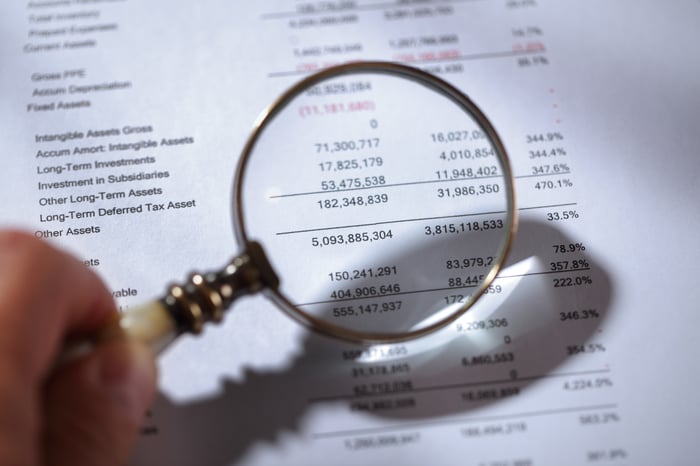Most investors don't look forward to heightened volatility -- but Robinhood users aren't like most investors.
Online investing app Robinhood, which offers commission-free trades and gifts shares of stock to new members, is best known on Wall Street as the app where millennial and novice investors chase penny stocks, momentum plays, and otherwise subpar companies.
While it's great to see young people showing an interest in the greatest wealth creator on the planet, it's also concerning that so few of its members seem to understand the importance of buying quality businesses and taking advantage of compounding over the long run. Most appear to be trying to get rich quick by piling into momentum plays.
In recent days, this momentum has been especially noticeable in publicly traded companies with high short interest.

Image source: Getty Images.
The most short-sold Robinhood stocks
Though most investors choose to keep things simple by buying or selling stock, the investing world also allows folks to bet against stocks by short-selling.
Without getting too far into the weeds, short-sellers make money when a stock's share price goes down, with gains capped at 100% (i.e., the share price can't drop below $0). Meanwhile, the losses short-sellers can realize are unlimited because a stock's share price has no upside ceiling. When short-sellers exit their position, they buy to cover the shares they've borrowed from their brokerage. This buy-to-cover action can result in a short squeeze if a lot of pessimists are running for the exit at the same time.
Of the 100 most held stocks on Robinhood, 20 of them have at least 16% of their shares held by short-sellers, relative to their available float. However, the following 10 companies are the most short-sold on the platform, according to financial data website Finviz.
- GameStop (NYSE:GME): 140.6% float currently held short
- Tilray: 41.7%
- Nikola: 37.7%
- AMC Entertainment Holdings (NYSE:AMC): 36.6%
- American Airlines Group: 34%
- Inovio Pharmaceuticals (NASDAQ:INO): 33.8%
- Blink Charging: 31.8%
- Virgin Galactic Holdings: 31.1%
- Workhorse: 31%
- TherapeuticsMD: 28.9%

Image source: Getty Images.
There are reasons pessimists have piled into these companies
The trading action in recent days has made it clear that large swaths of retail investors are targeting heavily short-sold securities and driving them into the stratosphere. It's also readily apparent that pessimism is warranted with these companies.
Multichannel video game and accessories retailer GameStop is where this recent message board-based manipulation started. Shares of the company are up more than 1,700% year to date despite the fact that the company is closing stores to reduce its costs and has lost money for three consecutive years. This isn't to say that GameStop isn't making progress in its cost-cutting efforts, or that it hasn't seen solid growth from its e-commerce push. But it makes little sense that GameStop is doubling on a daily basis when its long-term outlook is still in question.
Take Inovio Pharmaceuticals as another example. Inovio became a big-time momentum play in 2020 as one of the drug developers focusing on a coronavirus vaccine. Unfortunately, U.S. regulators delayed Inovio's phase 2/3 study, costing the company precious clinical testing time. What's more, Inovio has yet to bring a Food and Drug Administration-approved product to market in four decades. In other words, pessimism here appears logical.
There's also the high-flying movie theater chain AMC Entertainment. AMC was knocking on bankruptcy's door just days ago. It managed to secure $917 million in funding from a combination of debt and equity financing. This financing doesn't change the fact that AMC's operations are in shambles because of the pandemic, and there's no timetable as to when things might return to normal. Even after the pandemic, the demand for streaming content might outweigh consumers' desire to head to the movie theater.
Similar short-seller cases could be made for each of the companies mentioned above.

Image source: Getty Images.
Focus on what matters
The important takeaway is this: Heavily short-sold stocks usually draw pessimism for good reasons. However, just because a stock has relatively high short interest, it doesn't mean it's not investable.
As a good example, satellite radio operator Sirius XM (NASDAQ:SIRI) is the 16th-most short-sold stock on Robinhood, with 18.3% of its float held by short-sellers. Though this pessimism likely has to do with Sirius XM's debt ($8.3 billion) and the weak state of the U.S. economy, Sirius XM's underlying business is still in great shape.
Most terrestrial and online radio operators depend on advertising, but the Sirius XM operating model generates most of its revenue from subscriber fees. Through the first nine months of 2020, Sirius XM generated 81% of its sales from subscriptions and only 15% from advertising. Since ad spending tends to fall off a cliff during recessions while subscription revenue hardly skips a beat, Sirius XM is usually in far better financial shape during economic downturns than its peers.
Amid this insane volatility, investors must focus on what matters. We can't control the emotions of short-term traders, but we know for a fact that operating earnings growth is what drives equities higher over the long run. Ignore the white noise and focus on what's important.
"short" - Google News
January 31, 2021 at 06:06PM
https://ift.tt/3pz0eik
10 Robinhood Stocks With the Highest Short Interest - Motley Fool
"short" - Google News
https://ift.tt/2SLaFAJ

No comments:
Post a Comment